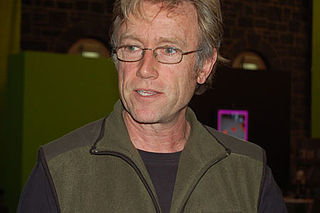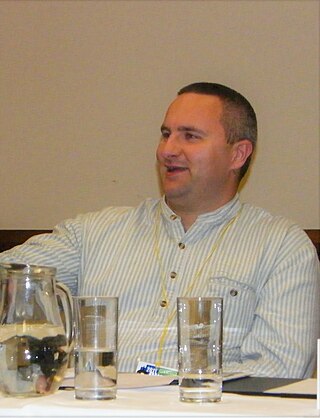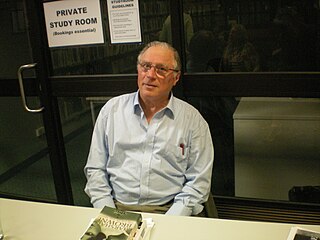Debra Oswald is an Australian writer for film, television, stage, radio, fiction and children's fiction.
Robert Dessaix, also known as Robert Jones, is an Australian novelist, essayist and journalist.
Christopher John Koch AO was an Australian novelist, known for his 1978 novel The Year of Living Dangerously, which was adapted into an Academy Award-winning film by the same name for which he co-wrote the screenplay. He twice won the Miles Franklin Award. In 1995, he was made an Officer of the Order of Australia for his contribution to Australian literature, and was awarded an honorary Doctor of Letters from his alma mater, the University of Tasmania, in 1990.
Carmelina Marchetta is an Australian writer and teacher. Marchetta is best known as the author of teen novels, Looking for Alibrandi, Saving Francesca and On the Jellicoe Road. She has twice been awarded the CBCA Children's Book of the Year Award: Older Readers, in 1993 and 2004. For Jellicoe Road she won the 2009 Michael L. Printz Award from the American Library Association, recognizing the year's best book for young adults.

James "Jim" Moloney is an Australian children's author. A prolific writer whose books span an age range from seven- to seventeen-year-olds, he is best known for his young adult novels. He has been nominated and won awards for his books in the Children's Book Council of Australia Awards. His books have been translated into French, Korean, Lithuanian and Flemish/Dutch.

Paul Collins is an Australian writer and editor who specializes in science fiction and fantasy.
Alan Gould is a contemporary Australian novelist, essayist and poet.

Oisín McGann is an Irish writer and illustrator, who writes in a range of genres for children and teenagers, mainly science fiction and fantasy, and has illustrated many of his own short story books for younger readers. As of 5 September 2022, his most recent book is about climate change.

Adam Aitken is an Australian poet.

Vietnam, The Australian War is a 2007 non-fiction book (ISBN 9780732282370) written by Australian author and historian Paul Ham. The book is a comprehensive history of the First and Second Indochinese wars, written from a predominantly Australian point of view, namely, the First Indochina War and the Vietnam War. It sets the Australian involvement in the war in Vietnam in the context of the American and Vietnamese experiences. The book examines the impact of Australian and American relations on military decisions, the relationship between the two countries' governments, and the aftermath of the war. The author draws on voluminous sources, many of them recently declassified, and recounts the history of Indochina as far back as about 3,000 years.
Garry Disher is an Australian author of crime fiction and children's literature. He is a three-time winner of the Ned Kelly Award for Best Novel.
Barry Hill is an Australian historian, writer, and academic.

Marshall Browne was an Australian crime fiction writer.
Jacob G. Rosenberg (1922–2008) was an author and Holocaust survivor. Rosenberg's poetry and prose have been published in both Australia and overseas.
Peter Cowan was a Western Australian writer, noted especially for his short stories.
Dianne Wolfer is an Australian children's author who lives on the south coast of Western Australia.
Patti Miller, an Australian writer, was born and grew up near Wellington, New South Wales, Australia. She holds a BA (Communications) and an MA (Writing) from the University of Technology, Sydney (UTS). She is the author of ten books and numerous articles and essays published in national newspapers and literary magazines. She has taught literature and writing at UTS, University of Western Sydney, Australian Writers' Centre and other writers’ centres and is the founder and director of its Life Stories Workshop, which aims to develop and support memoir and creative non-fiction writing. Miller is a member of the Australian Society of Authors.
Steven Conte is an Australian novelist who won the inaugural Prime Minister's Literary Award for Fiction in 2008 for his novel The Zookeeper's War. His fiction has been published in Australia, New Zealand, the UK and Ireland, as well as in translation in Spain, Italy, Germany and the Netherlands.
John Clanchy is an Australian novelist and short story writer.

Displaced Person (1979) is a young adult novel by Australian writer Lee Harding. It was originally published by Hyland House in Australia in 1979, and simultaneously in USA by Harper & Row, under the title Misplaced Persons.







